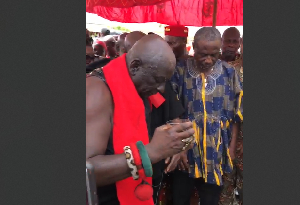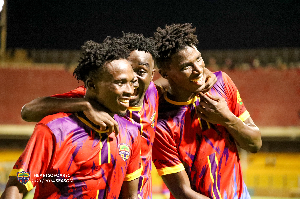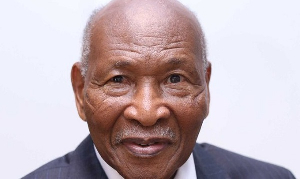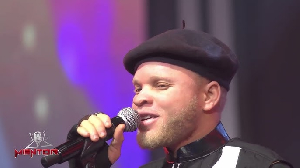Opinions of Tuesday, 23 June 2009
Columnist: Calus Von Brazi
Is The NPP Being ‘Contained’ Or ‘Encircled’?
Controversy Unlimited: Is The NPP Being ‘Contained’ Or ‘Encircled’?
The theory of ‘containment’ is one that students of world history, international security and diplomacy are very conversant with. United States of America diplomat, George F. Kennan rose to fame precisely because of his thesis on ‘containment’ which was interpreted by the defunct ideologues of the Soviet Union as “encirclement”. The entire concept of containment was enshrined in and signed off in 1946 through a famous diplomatic dispatch known as “The Long Telegram”, with Kennan identifying himself only by the letter or initial “X”, a convenient way of hiding his true identity so as not to jeopardize his relations with the Soviet establishment and also to offset the possibility of detection and hence expulsion from Russia as persona non grata. Anybody with a training in security who knows not of containment and encirclement cannot be described as having truly undergone security training. But what really do these two concepts connote?
For the Soviet Union, containment was the response of the US to its aggressive plan to ‘protect’ its interests in contiguous areas to the Union by creating or inducing the formation of satellite states with unquestionable allegiance to Moscow. For the US however, Moscow’s expansion into Eastern Europe and attempts at instigating riots and instability within Western Europe was its way of expanding and exerting its influence into places that were outside its ‘traditional’ sphere of influence. As a result of these ‘misinterpretations’ by the two protagonists, the Soviet Union came to the conclusion that the US was entering into alliances and arrangements with countries along the borders of the USSR in order to ‘encircle’ it and thereby gain an advantage should the Cold War break out into open conflict and military aggression. The US on the other hand, came to the conclusion that there was an innate streak in the Soviet mindset and psyche that ensured that until the Union was ‘ring-fenced’, its expansionist predisposition would know no bounds and in effect, jeopardize world peace and security or more seriously, undermine the process of democratization and freedoms that had been introduced into the Western Hemisphere after the defeat of Nazi forces. Thus, containment and its antithesis of encirclement jostled for right of place in the heartland of Europe and in other far flung places until the relative irrelevance of the concepts became manifest upon the demise of the Soviet Union in 1989. Today, some twenty years after both the Soviet Union and Eastern Europe ‘raptured’ in a frenzy of historical changes starting from Glasnost and ending in Perestroika, the Janus-faced attributes of containment and encirclement are beginning to rear their dangerous heads within the Ghanaian body-politic. Let me explain my thesis presently.
The last general elections held between 7th December 2008 and 2nd January 2009 have revealed very dangerous fissures and fault lines along the ethnic demographics of Ghana. I am not an apologist of ethnocentrism of any sort truth be told, but I deem it proper to send a warning signal, lest some day, we hold our locked hands upon our heads and sob, “I should have spoken my mind, perhaps we wouldn’t have gotten here”. What am I trying to say in this regard? By the end of the second round of voting on December 28, it had become clear that the ruling National Democratic Congress (NDC) had more or less established a firm lead in what is arguably eight out of the ten regions in Ghana, with the opposition New Patriotic Party (NPP) retaining a decisive presence in the remaining two regions. Thus, with the exception of the Ashanti and Eastern regions, the NDC was the winner in relative terms in the remaining electoral zones within the Upper East and Upper West, Northern, Brong Ahafo, Volta, Greater Accra, Western and Central regions. Notwithstanding some marginal and interesting wins in constituencies within the regions by both parties (e.g. Lawra and Bawku fell to the NPP while Cape Coast and Tain went to the NDC), what became clear was that the NPP had lost the elections at both the parliamentary and presidential levels. I hasten to add, that since 1992, no party has won political power in Ghana without having a lead in parliamentary seats. In other words, no party can win political power in Ghana without having the majority of seats, slim though it may be, in parliament. That being the case, the incontrovertible truth then is, “win a majority of seats, and you are effectively in power, lose them, and waltz yourself into political irrelevance. That is why in all truth, the NPP dug its own grave with the Mafioso style parliamentary primaries that preceded the general elections of December 7, 2008. Had the process been as fair as some of us hoped it would have been, without the overt and covert acts of certain individuals within the party, there was no way the NPP would have lost 31 seats and gained 11. By that Mafioso style conduct, the NPP had successfully ‘contained’ itself and allowed the NDC to effectively ‘encircle’ it even before the first ballot was cast.
The above digression into one of the reasons for the NPP’s loss of power vis-à-vis the general theme of this article is to show that for any grander containment or encirclement to take place, the seeds of internal discontent must be effectively sown, thereby softening the grounds upon which an opponent would dig to uproot you. In this case, the aspirations of entire constituents, especially those pertaining to the popular choices of the voters in the constituents were subsumed under the rubric of God-knows-what and thereby sounded the death knell of the NPP. The question then is: if the NPP can behave like a snake and eat its own tail, what is likely to be the attitude and disposition of its most ardent critics and avowed political opponents, who had learnt the lesson of abstaining from unnecessary and parochial interference in parliamentary primaries? The truth of the matter is that there is always punishment for imposition of candidates against the popular will and preferences of the people on whose behalf those impositions are made, whether or not it emanates from a Founder, National Executives, Former Chairmen, Presidential Candidate or Council of Elders. The NDC learnt it bitterly in the year 2000. It is indeed hurtful to assert frankly, that the NPP had to learn this basic truism, 8 years after it had ridden to power on the back of the very same mistake the NDC did in the year 2000. Maybe there is some truth in the statement that politicians don’t learn.
Now if politicians really don’t learn, how about groups, interests and their material capabilities that determine the fortunes of regions, states, and continents? It is the frightful nature of the repercussions of our deliberate oversight on issues of contemporary significance, unveiled by the voting patters as revealed in the last elections that give me cause for concern. Let us look at it from a socio-political perspective. The results of the last elections, demonstrate that the NPP cannot win any election without the majority of votes from the Eastern and Ashanti regions firmly intact. Thus anytime the NPP maximizes its votes in these two regions and wins additional pockets of votes in the remaining regions, it is likely to annex the reins of power. Conversely, the NDC does not need to win Ashanti or Eastern regions to win political power insofar as it maintains its increasingly diminishing grips over especially the two northernmost regions (Upper East, Upper West), Northern and its loyal stronghold of the Volta region. If and when the NDC manages to swing any of the three swing regions, Greater Accra, Central and Western in addition to its core regions mentioned above, you can be sure that the NPP would be in deep trouble. The import of the above in terms of its socio-political impact is to demonstrate that the NPP, wrongly perceived as an “Akan Party”, has been effectively ring-fenced, nay, ‘contained’ by an interesting mix of non-Akan ethnic groups, stretching from the north-western part of Ghana, through the north-east, then along the entire eastern frontier of the country before a detour through Greater Accra and its Ga-Adangme speaking people and ending in Nzema Land back in the South-Western part of Ghana. It is true, that there are pockets of non-indigenous people in all the aforementioned places but the fact remains that majority of these non-indigenes are essentially settlers who have very little impact in the political dynamics of the dominant social groups within the regions. One is then tempted to ask if there is a subtle alliance to keep the Akans (taken here to mean all variants of Twi speaking people excluding Fantes) out of political power if the results of the 2008 elections especially and those preceding it are anything to go by, based on the wrongful perception that the NPP is an “Akan Party”? If the answer to the question is yes, what would it mean for the social cohesion of Ghana if all Twi-speaking people start to vote in a certain direction? Now the answer to that, irrespective of how one looks at it is not funny, for we shall have a situation where Sefwis, Ahantas, Wassa People, Guans of all sort throw their weight and support behind the wrongly perceived “Akan Party” during elections. We do live in a continent that contains a country called Rwanda, where such ethno-centric political maneuverings led to human imposed Armageddon on an otherwise peaceful and somewhat pliant citizenry. It is only logical to state that reversed containment could be just as dangerous as inverted encirclement depending on the dynamics in vogue and the material capabilities of the interests and groups at play as far as the electoral activities of the Ghanaian body politic is concerned.
Significantly more dangerous if not equally important to the possibility of ethnocentric conflagration and ‘rapture’ is the military implications of the voting patterns. Now using the same indices as our point of reference, we can deduce from the results, that with the exception of the Brong Ahafo region which gave almost a 50-50 result to the two dominant parties, the predominantly Twi-Speaking peoples of Ghana have been firmly encircled, so that in case any miscreant chooses to display Constitutionally deviant behaviour, the Twi-speaking peoples would have nowhere to turn to, either in terms of allies, bases or supply lines. For ethnically opposed people to surround you at every turn means in any kind of war, you cannot refill, replenish, restock or enjoy temporary respites for even before any such war (God forbid) starts, the backs of Twi-speaking people are pushed against nothing: nothing because they cannot access the sea to escape, neither can they enter Ivory Coast with all its fragile nature hanging in the balance. I will not mention the northern or Volta regions for obvious reasons. Much as it might be fashionable for any reader to dismiss these thoughts as those of “another embittered NPP faithful”, I pray that the reader would separate the politics from the realities that can be gleaned if we remain focused on the cohesion of our beloved nation. Something untoward is being imposed on Ghana as a result of our voting patterns. Something frightening is gestating both within Ghana and along its borders; a monster is energizing itself on the bedrock of our ethnic diversity which while it would be nice to have as a unifier, is gradually morphing into the fire that may be breathed down our heads, should that monster ever shake itself out of a preferably eternal sleep. May it never be written of our motherland, that the very system that the good people of Ghana crafted as the mechanism by which its leaders would be chosen, turned round to encircle us and left in its wake, a containment from which the country was unable to rise ever again; let us ensure that such a thing, remains the sole record of ancient Ghana. Jehovah Raah be your lot, now and until we meet again next week!












